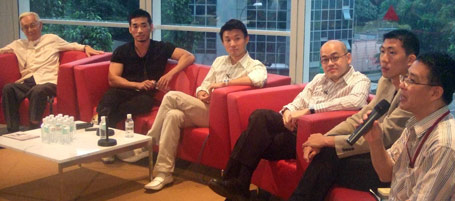Organised by theatre company W!ld Rice in conjunction with Happy Endings: Asian Boys Vol 3, a gay play that is currently being staged, the forum attracted some 250 people on Sunday evening.

Top of the page (from left) Reverend Dr Yap Kim Hao, Fridae CEO Dr Stuart Koe, PAP MP Baey Yam Keng, NMP Siew Kum Hong, moderator Ken Kwek, and gay activist Alex Au. (Photos courtesy of W!ld Rice.)
While all the members of the panel with the exception of Baey have made known their opposition to retain Section 377A of the penal code which criminalises gay sex acts, Baey for the first time publicly voiced his support for the law to be repealed.
"Personally, I think that the whip should be lifted for a very open debate and open expression of opinion by the MPs. And if that is so, I would vote for a repeal of the act."
"From my understanding of my parliamentary colleagues, my guess is that I will be the minority." He said in response to questions posed by member of the floor Dr Russell Heng, an academic and gay activist.
In April, MM Lee Kuan Yew told Reuters that he saw "no option for Singapore but to be part of it" when asked if the government would decriminalise gay sex acts eventually.
Opening the session was a discussion on whether the main opposition to repeal Section 377A is from a small vocal minority who is religiously motivated. Baey posited that not everyone who expresses discomfort with the concept of homosexuality was doing so because of his or her religious beliefs. Au further distinguished those who might be uncomfortable because they are unfamiliar with gay people from those who are reacting based on religious convictions and those who use religion and the gay issue for political aims.
Citing a Straits Times article in which PAP MP Lim Biow Chuan referenced the church, Dr Koe called for a clear separation of church and state and urged all elected officials to represent their constituents - who could be of other faiths or none - without bias.
When asked what his thoughts on homosexuality was, Lim was quoted in the papers as saying, "I think the position of the Church is correct, which is that we should hate the sin (homosexuality) but embrace the sinner."
Other topics that were discussed include whether the majority needs to agree with repealing the law or should the government take the lead, and whether proponents of the repeal of Section 377A should take a more pragmatic approach as mooted by NMP Siew.
Sworn-in in January this year, Siew, who is an outspoken critic of Section 377A, first came to the notice of the gay community in 2003 when he wrote a letter carrying 32 signatures (all of whom are heterosexual) to the Straits Times in response to an anti-gay column. In it, he urged "all gays in Singapore to take heart from our letter, to know that there are a lot more people out there who support their personal rights and freedoms."
Siew, who is of the belief that an argument based on civil rights would not go very far with the current administration, told the forum: "You've got to phrase it in the lingo that will convince the government. I think we all know. It is all about growth, job, money. If you can make a convincing case that 377A is somehow affecting that, then I think you've got a really good chance."
That view was however met with opposition from Au and Dr Koe who believe that civil rights should not be tied to a person's economic worth.
Au, a founding member of gay advocacy group People Like Us and Fridae columnist said: "Taking the economic argument presents a danger, which is to buy into the whole ideology that ultimately humans are digits. I want to base an argument purely on the human rights. Gay identity is very fundamental; it is as fundamental as your ethnic identity, as your linguistic identity, as your religious identity. That being the case, therefore the state through its tools, law, should give equal recognition to that liberty to express your identity."
The extensive review of the Penal Code, Singapore's primary criminal legislation, is expected to come up for debate in parliament in early 2008.

